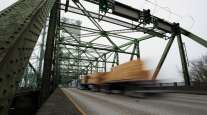Drone Demo Offers a Taste of the Future of Delivery

[Stay on top of transportation news: Get TTNews in your inbox.]
A Deuce Drone flew some smoothies to waiting consumers June 1 in Mobile, Ala., but the real payload might have been a peek at the legislative support that drone delivery startups need in order to get off the ground.
Deuce Drone executives pitched the day’s main event as a historic occasion: a small step for a few Lil’ Limeberries and Chocolate Chimps, a giant leap for consumers and businesses who stand to benefit from an automated airborne local delivery service.
The company’s founding advisers, including former Continental Aerospace CEO Rhett Ross and Burton Property Group CEO Philip Burton, have pitched Deuce Drone as an infrastructure innovator, not a drone manufacturer. Starting with off-the-shelf drones, the company is developing the software needed to take orders and manage delivery flights, as well as hardware such as “drone ports” that will largely automate tasks such as loading and recharging the aircraft.
“This sort of represents the culmination of a lot of hard work by a young team,” Deuce Drone COO Ed Fienga said as he set up the day’s demonstration for an audience that included U.S. Rep. Jerry Carl and Andrew Hinkebein, regional director for Sen. Tommy Tuberville (R-Ala.).
In the Deuce Drones vision, orders will be received via smartphone app. Employees at a participating business (represented by Tropical Smoothie Café in the June 1 exercise) will load an order into a preapproved cargo box, which a drone port will then load onto a drone. Automated flight management software will control the delivery, with a human air traffic controller ready to step in as needed. As a network of participating businesses and drone ports grows, a city’s fleet of drones can be shifted around to meet demand.
However, Fienga and others were upfront that the reality on June 1 was far short of that, for reasons including the current state of Federal Aviation Administration regulations.

At the table, seated from left: Deuce Drone COO Ed Fienga; company advisor Philip Burton, CEO of Burton Property Group; U.S. Rep. Jerry Carl; and Andrew Hinkebein, regional director for Sen. Tommy Tuberville. (Lawrence Specker/Alabama Media Group)
Even as one of a handful of companies with FAA approval to do what they were doing, Fienga and Burton said, the constraints were tight. So-called Part 107 certification requires direct line-of-sight observation of a drone by a human operator. While Deuce had won approval for a route between Mobile’s Legacy Village shopping center and the BB&T business building less than a quarter-mile away on the I-65 beltline, there were trees and other obstructions in between — so a series of observers were in position to keep eyes on the drone at all times, ready to tell the pilot to stop if some unexpected obstacle presented itself.
Total weight of drone and cargo has been limited to under 55 pounds, and the FAA has been very conservative about allowing Operations Over People, or OOP. A safety parachute system helped Deuce Drone get a waiver to operate, but that and other gear cut the operating payload down to about six pounds on June 1.
The upshot was that a human “loadmaster” loaded the drone, a human pilot stayed at the controls, human watchers kept visual contact, a human spotter helped the pilot nail the touchdown and a lot of radio chatter kept everyone in contact. (The company has previously demonstrated the ability of a drone to spot and hit a coded landing target by itself.) Fully apprised of all this, Carl and Hinkebein asked the sort of probing questions that investors might have posed: Did the drones know how to avoid midair collisions, what was their range, what were the benefits to businesses, and so on. Company executives offered answers and a request for help.
...If there are trillions of dollars that are going to be invested in infrastructure, then maybe there’s a pilot program that could be funded down in south Alabama to roll out some drone ports...
Burton Property Group CEO Philip Burton
“What we’re hoping to do is get your support with this industry because it is very, very heavily regulated by the FAA,” Burton said to Carl and Hinkebein.
“We are a software and a hardware company,” Burton said. “Software flight automation, hardware infrastructure. This technology, drone delivery service, cannot become a reality without infrastructure.” He said the company’s drone port model is “the most effective way for this service to be rolled out nationally.”
“I think this is the perfect time to mention that if there are trillions of dollars that are going to be invested in infrastructure, then maybe there’s a pilot program that could be funded down in south Alabama to roll out some drone ports,” said Burton.
“I think he targeted that at you,” Carl commented to Hinkebein.
“If the U.S. is going to be a leader in this space, there’s going to have to be some public and private partnership,” Burton said. “A lot of companies that are in this space are actually going to different countries to start to develop this tech because the regulations are not as burdensome.” He said that those companies eventually will have to win FAA approval, whereas Deuce Drone is working step-by-step with the agency.
Carl and Hinkebein seemed to see the potential. “I’m sure Chick-fil-A would love this,” said Hinkebein, who also asked about clusters of businesses utilizing a single drone port.
Burton said that as a property developer, he believes the managers of shopping centers and office parks have an incentive to put in drone ports, because it will help them claw back some of the business retailers have lost to online sales. “You do two things,” he said. “You create the means to compete in an e-commerce world for those retailers. And two, the landlords themselves are going to make that investment, because, hell, if they can make that investment and create an amenity for their tenants, then you’ve created a real interesting solution. And the commercial real estate world is vying for a means to be competitive.”

Lawrence Specker/Alabama Media Group
Fienga said Deuce Drone is a hybrid, in many ways. It’s sort of an air carrier, like Delta. It’s sort of a food handler. (The smoothies delivered on June 1 were covered with Deuce Drone tamper seals.)
Full operations of the sort Deuce Drones wants to offer will require FAA Part 135 certification, which among other things allows drones to fly beyond visual range of the observer. Approvals under Part 135 have been extremely limited.
One other potential complication: Fienga said there was some concern in the industry about communities pre-emptively establishing no-fly zones before operators got a chance to make their case. “We don’t want to create ‘drone deserts,’ ” he suggested to Carl and Hinkebein.
Between the technological and regulatory hurdles, it’ll be a while before delivery drones are free to fly on a commonplace basis. This demonstration, with Carl and Hinkebein watching out a window as a Deuce Drones unit named Zoe flew to the roof overhead, offered just a small, sweet taste of that future.

U.S. Rep. Jerry Carl (left) and Andrew Hinkebein, regional director for Sen. Tommy Tuberville, watch a Deuce Drone flight approach the BBT center in Mobile. (Lawrence Specker/Alabama Media Group)
“This is a line-of-sight, manual production today,” said Fienga. “But we’ve created a very detailed script. We’ve run it several times, many times. Everything we’ve done, this is sort of the blueprint for automation in the future.”
“I’m very impressed, I’m just awed … I’ve been telling everybody this was coming,” said Carl. “We’ve got a little ways to go, we don’t need drones running into one another up there, we’ve got to figure out how to keep them separated.” He said he saw Deuce Drones as a strong new addition to Mobile’s rich history in aviation.
“Best smoothie delivery I ever had,” said Hinkebein.
Fienga said that Deuce Drone expects to begin running commercial deliveries on a limited basis in mid-June, flying the same route from Legacy Village to the BB&T center, where Burton Property Group, Tuberville and Carl all have offices. FAA approval is specific to the route, Fienga said. The service may initially be offered one day a week, he said, and later expanded.
Want more news? Listen to today's daily briefing below or go here for more info:
Distributed by Tribune Content Agency, LLC





